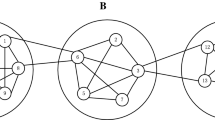Abstract
Members of the group decision-making often interact before voting, and tend to be influenced by people they communicate with. Such connections often comprise a social network and can be analyzed using the theory and method of complex network. Thus, we defined the ability of change the initial inclination of neighbor-voters as the Recessive Power, and proposed a binary voting power measure model of the decision-maker’s Recessive Power. The proposed method considered the knowledge level, individual influence and self-confidence level, and the interaction of viewpoints based on the social relationship network. Finally, a case analysis was described to demonstrate the application and effectiveness of the proposed method.
Access this chapter
Tax calculation will be finalised at checkout
Purchases are for personal use only
Similar content being viewed by others
References
Asif W, Qureshi HK et al (2016) Combined banzhaf & diversity index (cbdi) for critical node detection. J Netw Comput Appl 64:76–88
Banzhaf JF (1964) Weighted voting doesn’t work: a mathematical analysis. Rutgers L Rev 19:317
Courtin S, Tchantcho B (2015) A note on the ordinal equivalence of power indices in games with coalition structure. Theory Decis 78(4):617–628
Courtin S, Nganmeni Z, Tchantcho B (2016) The shapley-shubik power index for dichotomous multi-type games. Theory Decis 81(3):413–426
Guo C, Shi RL, Jin M (2017) Group decision opinion evolution and simulation based on community and individual influence power. J Intell Fuzzy Syst 33(5):2667–2676
Kittel B, Kanitsar G, Traub S (2017) Knowledge, power, and self-interest. J Public Econ 150:39–52
Kurz S (2014) Measuring voting power in convex policy spaces. Economies 2(1):45–77
Lesser O, Naamani-Dery L et al (2017) Group decision support for leisure activities using voting and social networks. Group Decis Negot 26(3):473–494
McClurg SD, Sokhey AE (2009) Social networks and correct voting. Working Papers p 3
Pajala T, Korhonen P et al (2018) Accounting for political opinions, power, and influence: a voting advice application. Eur J Oper Res 266(2):702–715
Richey S (2008) The autoregressive influence of social network political knowledge on voting behaviour. Br J Politi Sci 38(3):527–542
Shapley LS, Shubik M (1954) A method for evaluating the distribution of power in a committee system. Am Politi Sci Rev 48(3):787–792
Vanden BR, Steffen F (2012) Axiomatizations of a positional power score and measure for hierarchies. Public Choice 151(3):757–787
Vanden BR, Rusinowska A, Steffen F (2011) Measuring power and satisfaction in societies with opinion leaders: dictator and opinion leader properties. Homo Oecon 28:161–185
Vanden BR, Rusinowska A, Steffen F (2013) Measuring power and satisfaction in societies with opinion leaders: an axiomatization. Social Choice Welf 41(3):671–683
Wasserman S, Faust K (1994) Social network analysis: methods and applications, vol 8. Cambridge University Press
Yang X, Shi R, Guo C (2017) Analysis of individual influence on group decision making based on complex network. J Southwest Univ Sci Technol 32:73–79
Zhao X, Shang Y et al (2016) Leader’s relational power: concept, measurement and validation. Eur Manag J 34(5):517–529
Acknowledgements
We would like to thank the National Natural Science Funds of China (Project No. 71471123; 71571126), and the Fundamental Research Funds for the Central Universities (Project No.skqy201621; skgt201502) for their support during the research of the paper.
Author information
Authors and Affiliations
Corresponding author
Editor information
Editors and Affiliations
Rights and permissions
Copyright information
© 2019 Springer International Publishing AG, part of Springer Nature
About this paper
Cite this paper
Shi, R., Guo, C., Gu, X., Liu, Y. (2019). A Binary Voting Power Measure Method Based on Social Network and View Interaction. In: Xu, J., Cooke, F., Gen, M., Ahmed, S. (eds) Proceedings of the Twelfth International Conference on Management Science and Engineering Management. ICMSEM 2018. Lecture Notes on Multidisciplinary Industrial Engineering. Springer, Cham. https://doi.org/10.1007/978-3-319-93351-1_12
Download citation
DOI: https://doi.org/10.1007/978-3-319-93351-1_12
Published:
Publisher Name: Springer, Cham
Print ISBN: 978-3-319-93350-4
Online ISBN: 978-3-319-93351-1
eBook Packages: Intelligent Technologies and RoboticsIntelligent Technologies and Robotics (R0)




